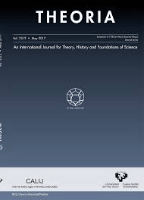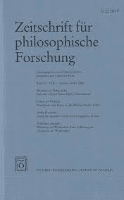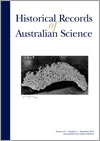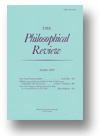
Foundations of Science
Scope & Guideline
Bridging Disciplines in the Pursuit of Knowledge
Introduction
Aims and Scopes
- Philosophical Foundations of Science:
The journal frequently addresses philosophical questions surrounding science, such as the nature of scientific explanations, the role of paradigms, and epistemological issues related to knowledge production. - Interdisciplinary Approaches:
Research often integrates insights from diverse fields including biology, physics, sociology, and technology, reflecting a commitment to a holistic understanding of science's role in society. - Historical Contextualization:
The journal emphasizes the historical evolution of scientific concepts and practices, providing insights into how past scientific advancements influence contemporary thought. - Methodological Innovations:
There is a strong focus on innovative methodologies in scientific research, including discussions on the implications of computational models, experimental designs, and theoretical frameworks. - Socio-technical Dynamics:
The journal explores the interplay between science, technology, and society, examining how cultural factors shape scientific discourse and practice. - Emerging Technologies and Ethics:
The implications of emerging technologies and their ethical considerations are recurrent themes, indicating a concern for the societal impact of scientific advancements.
Trending and Emerging
- Interdisciplinary Integration:
There is a significant trend towards integrating knowledge from various disciplines, such as combining insights from philosophy, cognitive science, and artificial intelligence, to address complex scientific questions. - Focus on AI and Technology:
Recent papers increasingly explore the implications of artificial intelligence and technology in scientific practice, indicating a growing awareness of their transformative potential. - Cultural and Ethical Dimensions of Science:
Emerging themes include the examination of science as a cultural product and the ethical implications of scientific advancements, reflecting a societal shift towards more responsible and inclusive scientific practices. - Complex Systems and Emergence:
Research focusing on complex systems, emergence, and non-linear dynamics is on the rise, highlighting a shift towards understanding scientific phenomena in holistic and interconnected ways. - Philosophy of Technology:
The journal is witnessing a growing interest in the philosophy of technology, particularly in relation to how technological advancements shape scientific inquiry and societal structures.
Declining or Waning
- Traditional Physics-Centric Approaches:
There has been a noticeable decline in papers focusing solely on classical physics or traditional methodologies, as the journal increasingly emphasizes interdisciplinary and philosophical inquiries. - Reductionist Perspectives:
The prevalence of reductionist views in the analysis of complex systems has diminished, with a growing preference for holistic and integrative approaches that consider the interactions within systems. - Historical Exclusivity:
While historical analysis remains important, the focus has shifted away from narrowly defined historical narratives towards broader discussions that incorporate contemporary implications. - Purely Theoretical Constructs:
The journal appears to be moving away from publications that are strictly theoretical without empirical grounding, favoring works that bridge theory with practical applications and real-world implications. - Conventional Methodological Discussions:
Discussions centered on conventional methodologies without innovative or interdisciplinary aspects have become less frequent, indicating a shift towards more dynamic, integrative research approaches.
Similar Journals

THEORIA-REVISTA DE TEORIA HISTORIA Y FUNDAMENTOS DE LA CIENCIA
Fostering Global Conversations on Scientific HeritageTHEORIA-REVISTA DE TEORIA HISTORIA Y FUNDAMENTOS DE LA CIENCIA, published by the Servicio Editorial Universidad del País Vasco, is a leading open access journal dedicated to advancing the fields of History, Philosophy of Science, and related disciplines since its inception in 2003. With a robust impact factor placing it in the esteemed Q1 and Q2 quartiles in its respective categories, this journal serves as a crucial platform for researchers, professionals, and students who are engaged in profound discussions and analyses of scientific foundations and historical contexts. Based in Spain, THEORIA has consistently demonstrated its commitment to scholarly excellence, achieving notable rankings in Scopus, particularly in the fields of Arts and Humanities, where it holds a rank of #169 in Philosophy and #59 in History and Philosophy of Science. The journal not only allows immediate open access to its diverse range of articles, fostering global knowledge dissemination, but also aims to bridge connections across varied philosophical inquiries and historical explorations within science. Join the dialogue today in shaping the future understanding of our scientific heritage.

Filozofia Nauki
Innovating Perspectives on the Philosophy of InquiryFilozofia Nauki is a distinguished academic journal published by the Institute of Philosophy at Warsaw University, Poland, with a dedicated focus on the interdisciplinary realms of Philosophy and the History and Philosophy of Science. Since its transition to Open Access in 2020, the journal has broadened its reach, allowing scholars worldwide to engage with its content without barriers. The journal boasts an important standing in the academic community, currently ranked Q2 in Philosophy and Q3 in History and Philosophy of Science as of 2023, reflecting its impact and relevance. With an H-Index indicating its citation influence, the journal aims to foster critical discourse, sharing innovative research and ideas that push the boundaries of knowledge in these fields. Its Scopus rankings, with a percentile of 58th in Philosophy and 41st in the History and Philosophy of Science, further highlight its growing prestige. As it continues to publish cutting-edge research, Filozofia Nauki stands as a vital resource for researchers, professionals, and students committed to exploring the philosophical dimensions of scientific inquiry, ensuring a robust forum for discussion and discovery.

ZEITSCHRIFT FUR PHILOSOPHISCHE FORSCHUNG
Illuminating Complex Philosophical Issues with Rigorous Scholarship.ZEITSCHRIFT FUR PHILOSOPHISCHE FORSCHUNG is a prestigious academic journal published by Vittorio Klostermann GmbH in Germany, dedicated to the interdisciplinary field of philosophy. With its ISSN 0044-3301 and E-ISSN 1439-2615, this journal has made significant contributions to the philosophical discourse since its inception in 1977, continuing its pursuit of excellence in scholarship through 2024. Recognized in the 2023 category quartiles as Q2 in Philosophy, it is ranked #498 out of 806 in the Arts and Humanities' Philosophy classification by Scopus, placing it in the 38th percentile. Although it currently does not offer open access options, its rigorous peer-reviewed articles serve to enrich the scholarly community's understanding of complex philosophical issues. ZEITSCHRIFT FUR PHILOSOPHISCHE FORSCHUNG plays a vital role in advancing philosophical research in a collaborative academic environment, making it a valuable resource for researchers, professionals, and students alike.

Filosofiya-Philosophy
Illuminating the Path of Philosophical ExplorationWelcome to Filosofiya-Philosophy, an esteemed academic journal dedicated to advancing the field of philosophical inquiry. Published by NATSIONALNO IZDATELSTVO AZ BUKI, this journal aims to foster scholarly exchange and promote critical discussions on various philosophical themes and issues, including but not limited to metaphysics, ethics, logic, and epistemology. With its commitment to rigorous research and thought-provoking analyses, Filosofiya-Philosophy seeks to engage researchers, professionals, and students alike, enriching the discourse surrounding philosophical studies. Although currently not an open-access journal, it provides valuable insights that are crucial for the continuous exploration of philosophical ideas. Based in Sofia, Bulgaria, it plays a vital role in the dissemination of philosophical knowledge, inviting submissions from around the globe to enhance its academic community and further its impact in the realm of philosophy.

European Journal for Philosophy of Science
Navigating the Philosophical Landscape of Scientific InquiryThe European Journal for Philosophy of Science, published by SPRINGER, stands as a prestigious platform for scholars in the realms of philosophy and history of science. With an impressive impact factor and categorized in the Q1 Quartile for both History and Philosophy of Science and Philosophy, this journal ranks among the top 10% of its peers, reinforcing its critical role in advancing academic discussions and insights within these fields. With its composition of rigorous peer-reviewed articles and a commitment to fostering interdisciplinary dialogue, the journal navigates foundational and contemporary issues that shape scientific inquiry. Although currently not Open Access, it provides invaluable access to researchers, professionals, and students who seek to deepen their understanding of the philosophical underpinnings of scientific practice. Housed in the Netherlands, the journal continuously engages with the evolving landscape of philosophy in the scientific domain, making it a key resource for anyone invested in the intersection of science and philosophy.

Historical Records of Australian Science
Connecting Past Innovations to Future Insights.Historical Records of Australian Science is a premier academic journal published by CSIRO PUBLISHING, focusing on the rich legacy and contributions of Australian science from its inception to contemporary advancements. The journal is integral to the Arts and Humanities and Social Sciences fields, operating within a unique niche that fosters interdisciplinary dialogue and research. With its ISSN 0727-3061 and E-ISSN 1448-5508, it encompasses a diverse scope spanning historical analysis, philosophy of science, demography, and human factors. Although it is currently categorized into Q3 and Q4 quartiles across various relevant spheres in 2023, the journal strives for excellence in archiving pivotal scientific milestones as it continues to publish valuable insights, encouraging submissions from scholars globally. Its commitment to enriching scholarly discussion makes it a crucial resource for researchers, professionals, and students keen on exploring the historical narratives that have shaped Australia’s scientific landscape. With a convergence of knowledge from 1980 through to 2024, the Historical Records of Australian Science stands as a vital repository for those delving into Australia’s scientific heritage.

PHILOSOPHICAL REVIEW
Elevating Scholarly ConversationsPHILOSOPHICAL REVIEW, published by DUKE UNIVERSITY PRESS, is a leading academic journal in the field of philosophy, recognized for its rigorous scholarship and impactful contributions to theoretical and applied philosophy. With an impressive Q1 ranking in the 2023 Scopus metrics, it places within the top percentile of philosophical journals, affirming its significance in the discourse. The journal, which has a rich publication history since its inception in 1970, focuses on a diverse range of philosophical topics, catering to a broad audience of researchers, practitioners, and scholars. Although it doesn't offer Open Access options, its articles remain highly sought after for their depth and quality. With a dedicated readership and a commitment to exploring fundamental philosophical questions, PHILOSOPHICAL REVIEW continues to shape contemporary philosophical thought and engage with pressing issues in various domains.

SYNTHESE
Championing excellence in scholarly contributions.SYNTHESE is a prestigious academic journal published by Springer, renowned for its contributions to the fields of Philosophy and Social Sciences. With a distinguished history dating back to its inception in 1936, this journal continues to thrive, offering a platform for innovative and critical discourse. Recognized for its excellence, SYNTHESE holds a remarkable Q1 quartile ranking in both Philosophy and Social Sciences (miscellaneous) as of 2023, placing it within the top tier of scholarly publications. Its impressive Scopus rankings further underscore its influence, boasting a rank of #48 out of 806 in Philosophy and #70 out of 275 in General Social Sciences, thereby reflecting a 94th percentile in the arts and humanities. The journal's scope encompasses a wide array of interdisciplinary and philosophical inquiries, making it a vital resource for researchers, professionals, and students seeking to deepen their understanding of complex social issues. With access options that promote scholarly connectivity, SYNTHESE is committed to advancing knowledge and fostering intellectual engagement within the global academic community.

Oeconomia-History Methodology Philosophy
Exploring the Intersections of Economics, History, and PhilosophyOeconomia-History Methodology Philosophy, published by ASSOC OECONOMIA, is a distinguished academic journal focused on the interdisciplinary study of economics, history, methodology, and philosophy. With its ISSN 2113-5207 and E-ISSN 2269-8450, this Open Access journal has been committed to disseminating high-quality research since 2011, enabling widespread accessibility to its content. Based in Paris, France, the journal holds impressive rankings, including a Q1 quartile in History and a Q3 quartile in both Economics, Econometrics and Finance, as well as Sociology and Political Science for 2023. This diversity highlights its multifaceted approach to understanding complex societal issues. With significant visibility in leading databases, including Scopus, it appeals to researchers, professionals, and students alike, fostering robust discussions and innovative insights in their respective fields. The journal currently spans from 2018 to 2024, offering a platform for critical analyses and theoretical advancements that challenge established norms and encourage new perspectives.

Rhizomata-A Journal for Ancient Philosophy and Science
Connecting Historical Insights with Contemporary DiscourseRhizomata - A Journal for Ancient Philosophy and Science is a key academic publication dedicated to exploring the intricate intersections of ancient philosophical thought and scientific inquiry. Published by WALTER DE GRUYTER GMBH, this journal has established a significant presence in the field since its inception in 2013, with its convergence years extending to 2024. With a strong Q2 ranking in both the History and Philosophy of Science and Philosophy categories, it offers rigorous peer-reviewed articles that engage with the historical context and evolution of scientific ideas. The journal enjoys a commendable standing in Scopus rankings, positioned at 310 out of 806 in Philosophy, and 126 out of 223 in History and Philosophy of Science, showcasing its relevance and impact within these disciplines. While currently not an Open Access publication, the journal is instrumental for researchers, professionals, and students eager to delve into the foundational theories that have shaped modern scientific discourse. Join the dialogue and contribute to the vibrant academic community by engaging with Rhizomata, where ancient wisdom meets contemporary thought.